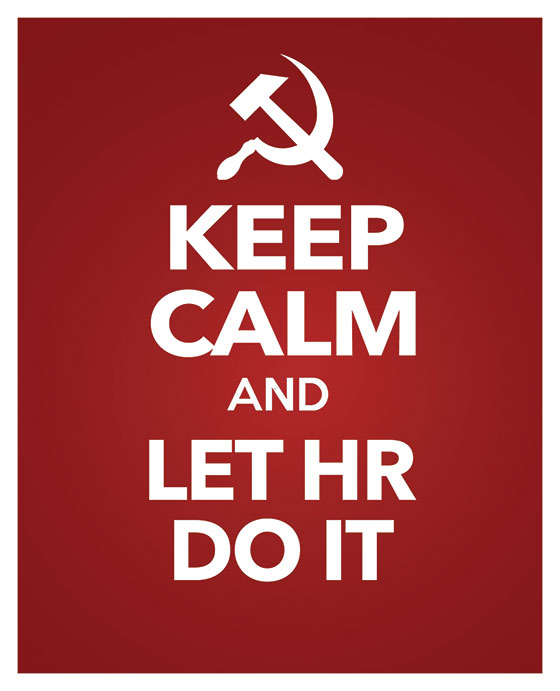or, the difference a Christian worldview brings to the HR world too
*****
“Kelsey, have you seen the Slack channel? Someone posted something that was kind of offensive.”
“Thanks so much for reaching out. I appreciate your concern – have you addressed this with the person who posted?”
“Well I personally wasn’t offended, and I am well able to stand up for myself – I’m a pretty outspoken person – and I don’t think it was intentional, but there might be people who are less outspoken than me who were offended. If the company were to do more sensitivity training to help others be more aware I’d definitely be in favor of that.”
*****
During my tenure in Human Resources (HR) I have received a number of messages to this effect. Not as many perhaps as some who work in a more compliance-driven environment (I have been blessed to have generally avoided that world), but enough. It isn’t surprising – after all, sensitivity training is seen by the HR world as the solution to so many problems, and we have trained that into our employees as well. However, there is something deeply misguided with the above interaction. It is the kind of response that, if catered to, is cancer to company culture.
So let’s dig in.
Isn’t it HR’s job to handle conflict?
First of all, I’d like to address the intent behind the employee reaching out. It is a good instinct to want to right a wrong. In every instance where an employee brought up a concern like this I am confident it came out of a desire to protect others and to create a better work environment for their coworkers. But if the goal is a better work environment, we need to ask ourselves does the solution presented actually create a better work environment?
You’ll note my response contains the question “have you talked to the person about it?” (Now to be clear – in this article we are talking solely about situations in which we have a reasonable confidence that there is no threat of violence and/or cause for concern in that area.)
Why would I ask this?
“If your brother sins, go and show him his fault in private; if he listens to you, you have won your brother. But if he does not listen to you, take one or two more with you, so that by the mouth of two or three witnesses every fact may be confirmed.” – Matt. 18:15-16
Let’s first consider this verse from the point of view of the person who is the offender. Imagine you are someone who has unknowingly caused offense. Would you prefer to have this talked about behind your back and analyzed by those who were not part of the situation? Or would you prefer someone come and talk to you about it first? No one likes being discussed behind their back. So don’t do that to other people. (The golden rule still applies at work.)
One key assumption I want to point out here, is that in situations like this (where this is a first offense or where the offense has gone unaddressed in particular) you must assume the best of the person. This is a clear theme in Scripture as well. Take Proverbs 18:13, “He who answers a matter before he hears it, it is folly and shame to him.” If you walk into a confrontation having assumed answers to all the questions you have not asked, you set your neighbor, and yourself, up for failure from the start.
Going straight to a person gives you the best chance to hear directly from the source about their motivations, without giving HR or someone else the power to imagine and assign motives different to, or beyond the bounds of, that situation. In short, if Stacy was having a bad day because she was feeling behind on her projects and so she came across as grouchy you don’t need HR to turn that into “Maybe Stacy really doesn’t want other women to succeed and that is why she was grouchy to another employee.” Maybe Stacy really does hate other women, but let’s not start there.
This comes down to the fundamental principles of honor and respect – do we want to treat employees as adults? Or do we want to create a world where people are afraid that even innocent mistakes will jeopardize their job? Assuming we all want the former, that means giving people the opportunity to face their accuser.
However, even if this approach is better for the offender, couldn’t it be argued that it prioritizes the needs of the accused over the person who was hurt?
Absolutely not.
As discussed above, bringing disagreements to someone else to handle creates a world in which motives are often incorrectly applied to the person accused. This very same issue also negatively affects the person who brings up the complaint. If you hand off a disagreement to HR you then give them the opportunity to creatively muddy and misrepresent your complaint. HR can now make the issue bigger or smaller than the person initially intended, based on the lens they apply to the situation. Aren’t we all too familiar with that? An issue taking on a life of its own and becoming far bigger than was appropriate, or a big issue being downplayed to nothing? Treating employees with dignity and respect also means empowering employees who have been wronged to be able to express exactly what the issue is, no telephone game required.
To answer the question asked in the heading then – no, it is not HR’s job to handle conflict. Happy to provide support to you as you handle it, though.
Isn’t it good to be sensitive?
So let’s talk about the response to the “have you talked to them about it” question. Each time it has been a “No” with a request for general sensitivity training to help people in the company be more aware about the ways in which they could potentially offend someone.
Sounds innocent enough, right? And yet here I am, calling it emotional communism.
What is communism? It is the Marxist doctrine that eliminates private property and as stated by Webster’s Dictionary, is a totalitarian system of government in which a single authoritarian party controls state-owned means of production.
Emotional communism, then, would eliminate private ownership of your need to address an issue, and would put the addressing of that issue in a single authoritarian party’s control.
And who runs that single authoritarian party? HR.
Enter the world of anonymous hotlines, and confidential HR backchannels. HR, instead of empowering you to directly address the offender, is now the one to address the issue and to roll out sensitivity training to the company as a whole. HR is now the one who determines the weight of your complaint, and the pathway forward.
Few of us with experience in the corporate world need to ask the question, “why is that a bad thing?” After all, HR’s bad reputation is no secret.
Remember when I said “every instance where an employee brought up a concern like this I am confident it came out of a desire to protect others”? Well, I have also had this concern brought up to me by fellow HR leaders. When I’ve discussed this philosophy with them around conflict management they have asked me “what about the people who do not feel comfortable speaking up?” As much as I wish this were different, every single time someone in HR has raised this question it was not in the context of taking care of the employee, but rather came from a desire (at least in part) to avoid successful lawsuits against the company.
I remember once as a freshly minted HR manager I went to an HR conference where a senior vice president, Human Resources, gave a short speech to us all regarding how proud he was of the sexual harassment training he’d just implemented for his company, to applause and congratulations from the HR group. He had been in HR for about as long as I’d been alive. In fact, I was surrounded by tenured HR leaders.
I remember raising my hand to ask a question.
“How do you know if this program is effective?” After all we all know sexual harassment is wrong. We want it to disappear from the workplace. So programs aimed at sexual harassment training should reduce that behavior, right?
I’ll never forget his blank stare. “It is legally required,” he replied. I tried again.
“Okay, let’s imagine for a moment a world in which it is not legally required. How would you be able to tell if your program is effective?” Again, a blank stare.
“Well, that’s not the case. It is legally required.”
That was the moment I realized: A) I never want to work in California, and B) HR’s real job in most organizations is to protect the company from employees, not for employees. And throughout my time in the HR world, that type of conversation became more and more frequent.
By relinquishing your right and ability to have difficult conversations with your coworkers to HR, you have given full authority to weigh the severity (or lack thereof) of your complaint to a group of people who are typically hired to protect the company from you.
On the whole, sensitivity training seeks to avoid conflict, because conflict can result in lawsuits. It trains people to be afraid of HR and, worse, each other; to walk on eggshells and to hesitate to speak up with an idea or any form of disagreement. “If I tell my manager that I think this project is going downhill, will she see that as sexism or honest feedback?” “If I tell my coworker that I think we should bring Jane onto the project, will he see this as subtle racism?” We all know the answer is usually no – but in a world driven by sensitivity training, we become more afraid it might be yes and that we won’t be given the opportunity to defend ourselves. After all, we have been trained that HR is generally more driven by the appearance of wrong, instead of what is true.
What can we do instead?
Jordan Peterson said, “It is far better to render beings in your care competent than to protect them.”
So how about instead of sensitivity training, we promote strength training – the kind of training that empowers people to have a voice, to be strong even in moments when they are offended or disagreed with, and does not penalize them for it. Let’s train people that you can care about each other even when you disagree with them. That is how we create work environments where we are able to work without fear of being fired for our beliefs, where we don’t need to feel like we have to pretend our religion is anything other than what it is. After all, wars are fought when we‘re no longer able to sit down together to reason with each other.
(Of note, this also requires that you hire the right people, people who will respond in love and not anger when confronted with their own wrongdoing. If someone does react poorly to being confronted that does become an issue for the manager or HR. That topic requires an article of its own.)
We are so afraid of direct conflict that we go round and round in circles to avoid it, accidentally building the offense into something bigger and bigger until it gets far out of our control and someone has to get fired. And suddenly HR is getting paid a heck of a lot more because, well, employing them is cheaper than a lost lawsuit.
At the end of the day, it is imperative that we build a culture of dignity and respect, where we understand that conflict is not in itself evil. As Max Lucado put it, “Conflict is inevitable, combat is optional.” People have different ideas, different opinions, and that is actually a good thing if we are daring enough to be uncomfortable.
This brings me to the true role of HR: to help people have a voice to speak up for themselves, not to take away their voice.
We worship a God who says “Count it all joy when you fall into various trials, knowing that the testing of your faith produces patience,” and “Take up your cross and follow me,” not a God who says “Live comfortably, avoid conflict, and don’t do hard things.” So let’s put in the work to help each other take ownership of the challenge of conflict, and be able to stand up for ourselves and for others, without needing to hide like a child behind his mother’s skirt.
Is this what your workplace looks like?
So ask yourself: are you empowered to stand up for what you actually believe, even if it isn’t the popular mood of the day? Are you and your team encouraged to respect each other even when you disagree? If you work in HR, are your employees able to tackle issues without you? Or are they dependent on you to handle difficult conversations?
I promise you, facing that awkward conversation at the start is a lot less daunting than the behemoth it can grow into when introduced to the world of compliance and hurt feelings. Yes, this takes a lot of time and effort, and a willingness to be uncomfortable and to face your own shortcomings. But remember this: whatever product you are working on or service you are selling will be long gone in 100+ years. The people you are working with however? Their souls are eternal.
Wherever you work, whatever the policies, you can be a light to those around you, and face conflict head on in gentleness and humility, honoring the people you interact with. We can do better than emotional communism. Let’s give people their agency back.











